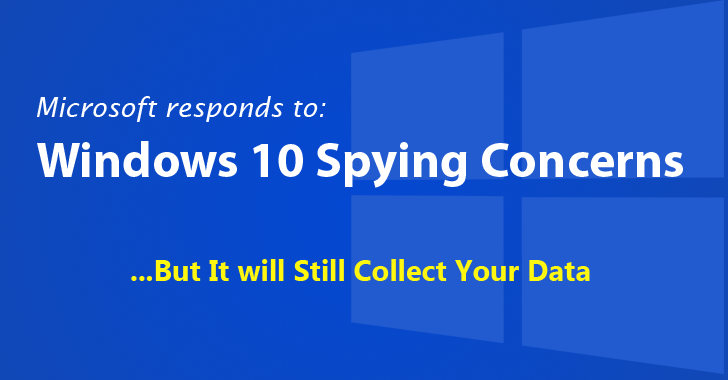Microsoft Responds To Windows 10 Spying Concerns, But It will Still Collect Your Data
After a number of controversial data mining features and privacy invasions within Microsoft's newest operating system, Microsoft finally broke the ice, almost two months since the launch of Windows 10.
Microsoft has finally responded to the growing privacy concerns around its new operating system to regain the trust of the users who are concerned about their online privacy related to Windows 10.
In a blog post published Monday, Windows chief Terry Myerson describes three ways in which Windows 10 collects and uses its users data – although he did admit that the OS does regularly phone home by default.
1. Data used for Safety and Reliability Data
This data includes anonymous device ID, device type and crash logs. It does not contain any content or files from your computer that directly identifies you.
What else?
Myerson claims that everything Microsoft collects is "encrypted in transit to [its] servers and then stored in secure facilities." Therefore, no one except Microsoft can be able to access it.
2. Personalization Data
This data helps the system know about your interests and habits in an effort to personalize Windows experience to you. This data includes Cortana, but Microsoft says, it is total unto you what data you want it to collect.
However, Myerson does not specify what type of personal information it collects. Does that include browsing history, typed text and spoken commands for Cortana?
Neither Myerson directly addresses the concerns around Cortana and OneDrive related features of sending data to Microsoft’s servers even after they are disabled.
3. Advertising Data
Despite serving ads in its products, Microsoft emphasizes that "no matter what privacy options you choose, neither Windows 10 nor any other Microsoft software scans the content of your email or other communications, or your files, in order to deliver targeted advertising to you."
According to Microsoft, two types of data are excluded from ad targeting:
- Communications (including e-mail and Skype)
- File Contents
However, everything else that the company collects from Cortana, Bing searches or store purchases could be used to delivered you targeted advertisements.
Myerson concluded, "Like security, we are committed to following up on all reported issues, continuously probe our software with leading edge techniques, and proactively update supported devices with necessary updates."
He does not answer one question related to major privacy concern: Why is Windows 10 phoning home even when we Turn Off all data collection and tracking features?
However, Myerson has tried well to reassure Windows 10 users that their personal data is fully secure. And, if any privacy issue is bothering you, you can report it here.


Comments